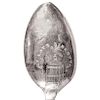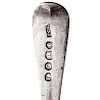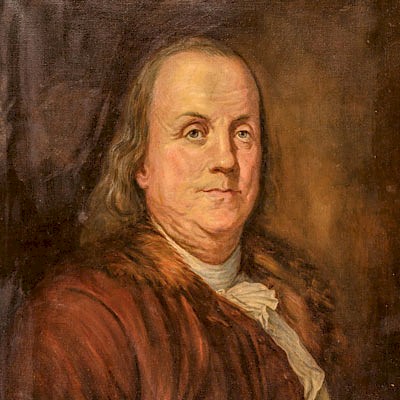c. 1770 I LOVE LIBERTY Patriotic Spoon, Bird Cage with Dove Escaping (America)
Lot 110
Estimate:
$400 - $500
Absentee vs Live bid
Two ways to bid:
- Leave a max absentee bid and the platform will bid on your behalf up to your maximum bid during the live auction.
- Bid live during the auction and your bids will be submitted real-time to the auctioneer.
Bid Increments
| Price | Bid Increment |
|---|---|
| $0 | $10 |
| $200 | $20 |
| $300 | $25 |
| $500 | $50 |
| $1,000 | $100 |
| $2,000 | $200 |
| $3,000 | $250 |
| $5,000 | $500 |
| $10,000 | $1,000 |
| $20,000 | $2,000 |
| $30,000 | $2,500 |
| $50,000 | $5,000 |
| $100,000 | $10,000 |
| $200,000 | $20,000 |
| $300,000 | $25,000 |
| $500,000 | $50,000 |
About Auction
By Early American History Auctions
Aug 24, 2019
Set Reminder
2019-08-24 12:00:00
2019-08-24 12:00:00
America/New_York
Bidsquare
Bidsquare : Autographs, Colonial Currency, Political Americana, Historic Guns
https://www.bidsquare.com/auctions/early-american-history-auctions/autographs-colonial-currency-political-americana-historic-guns-4347
Historic Autographs • Colonial Currency • American Civil War Colonial Era • Revolutionary War • Political Americana • Black History Early American History Auctions auctions@earlyamerican.com
Historic Autographs • Colonial Currency • American Civil War Colonial Era • Revolutionary War • Political Americana • Black History Early American History Auctions auctions@earlyamerican.com
- Lot Description
Colonial America
c. 1770 "I LOVE LIBERTY" Patriotic Spoon's Text Above A Bird Cage with Dove Escaping (America) Re: John Wilkes
c. 1770's Georgian Sterling Silver Teaspoon, with a Decorative American (British) Colonies Supportive Patriotic Theme, Hand-Engraved Initials "JMR", and integral stamped "I LOVE LIBERTY" above a Bird Cage, with a Dove Escaping (representing America) design, Supportive of John Wilkes, English, Choice Extremely Fine.
This wonderful decorated Patriotic theme Teaspoon measures about 5" long, and is in very high quality, British made yet possibly used in the American colonies. When John Wilkes (1725-1797) the British Radical Member of Parliament, who was imprisoned in the King's Bench Prison on May 10, 1768, and his supporters appeared before King's Bench in London, chanting "No Liberty, No King." Troops opened fire on these unarmed men, killing 7 and wounding 15, an incident that came to be known as the "St George's Fields Massacre." These circa 1770's Silver Spoons commemorate the freeing of John Wilkes who was a radical English journalist and politician. British subjects in the American Colonies closely followed Wilkes' career. His struggles convinced many colonists that the British constitution was being subverted by a corrupt ministry, an idea that contributed to the coming of the American Revolution. Wilkes was widely admired in the American Colonies as a political journalist, a radical politician, and a fighter for Liberty. He greatly influenced the revolutionaries who fought for American independence and played a role in establishing the right to freedom of the press in the United States by his example. Maker Hallmarked, bright silver with great eye appeal and highly detailed in overall excellent condition.
John Wilkes (17 October 1725 - 26 December 1797) was a British radical, journalist and politician. He was first elected a Member of Parliament in 1757. In the Middlesex election dispute, he fought for the right of his voters-rather than the House of Commons-to determine their representatives.
In 1768, angry protests of his supporters were suppressed in the St George's Fields Massacre. In 1771, he was instrumental in obliging the government to concede the right of printers to publish verbatim accounts of parliamentary debates. In 1776, he introduced the first bill for parliamentary reform in the British Parliament.
During the American War of Independence, he was a supporter of the American Rebels, adding further to his popularity with American Whigs. In 1780, however, he commanded militia forces which helped put down the Gordon Riots, damaging his popularity with many radicals. This marked a turning point, leading him to embrace increasingly conservative policies which caused dissatisfaction among the progressive-radical low-to-middle income landowners. This was instrumental in the loss of his Middlesex parliamentary seat in the 1790 general election.
At the age of 65, Wilkes retired from politics and took no part in the social reforms following the French Revolution, such as Catholic Emancipation in the 1790s. During his life, he earned a reputation as a libertine.
- Shipping Info
-
Early American provides in-house worldwide shipping. Please contact us directly if you have questions about your specific shipping requirements.
-
- Buyer's Premium



 EUR
EUR CAD
CAD AUD
AUD GBP
GBP MXN
MXN HKD
HKD CNY
CNY MYR
MYR SEK
SEK SGD
SGD CHF
CHF THB
THB














